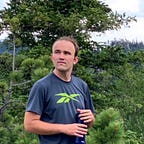When experience hurts
There are many things that we take for truth everyday. Education, diversity and experience are all things that we believe to be added benefits to teams and individuals. These are qualities that cannot be simply transferred from one to another.
I remember going to a developer conference in Las Vegas and the keynote speaker started out with a tagline,
“There is no compression algorithm for experience”.
~Andy Jassy (CEO of Amazon)
This made me smile and immediately think of my data compression teacher back in Nebraska (Khalid Sayood). I sent him a picture of the keynote slide and added that I missed our lively conversations. The next day he responds with his usual cleverness by saying. “Yes there is, its called books but it is quite lossy”. For those who do not deal with compression algorithms daily, this simply means that data is lost in the process of compressing it.
Much of my life, I feel that I have searched to gain experiences. It seems that the aggregation of one’s experiences is his value in society. As dystopian as that sounds, there is a ring of truth to it. I have read self-help books, done my daily devotions using various materials and listened to podcasts. However, despite all these efforts I feel very unequipped to handle the constant difficulty of life at times.
I have started to think, “What if I need to think smarter about how I gain experience?” Perhaps, running around getting experience in my work, church and community is not monotonically increasing my life skills. Perhaps some experiences degrade or diminish what I learned during other times.
Those who know me, know that Lincoln, Nebraska holds a precarious position in my heart. In one way, I spent four years of my life where I learned to be an adult and tackle life with grit and endurance. I look back and know that there was a purpose for those difficult times. However, I can see many ways that I also lost social skills, developed an anxiety and was emotionally scarred from the lack of sleep and constant waves of work and study that characterized my life.
Furthermore, our culture sometimes suffers from FOMO which causes us to run around looking for connections and to be involved in everything. This can result in young adults abandoning the development of good disciplines. These habits anchor our lives in stability and cause us to be more effective employees, parents and friends. This is currently where I am now growing. I am learning to slow down and to focus on habits that will make me not necessarily accomplish more but accomplish it with integrity and quality.
I was told this year by someone I trust that I shouldn’t view my sources for spiritual growth without discretion. That instead of trying to learn from everywhere, I should see myself as a student who has much to learn and pick a teacher to sit under and learn from. This intentional growing in grace and truth from specific trusted sources ironically has improved my ability to engage with ideas from all over the catholic (universal) church. Prior to sitting under the tutelage of my pastor, I had been led to confusion at every point. Naturally I probably have gained a narrower mindset on whether other viewpoints are truthful or not, however I can clearly see my knowledge of the Holy One in a state of growth and my posture of humility as the basis for that growth.
Reading Ordinary by Michael Horton has greatly shaped my perspective on my life as a mundane, but excellent way to exalt my creator in all things. Even the secular world has much to learn from this book. I have seen research labs I worked in seek flashy and exciting tech at the cost of ignoring good software disciplines. We are all drawn to make the most impact, but rarely think about the foundation we need to build first to accomplish that over time.
